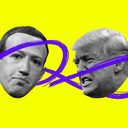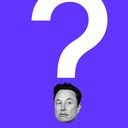The winner of today's AI race might be a company that doesn't exist yet
A hot startup that grew overnight into a billion-dollar behemoth is racing with established tech giants for supremacy in a new market that everyone expects will unlock a future of abundance and profit.
Flashback: That sounds like a description of OpenAI vs Google et al., but it's actually an account of the "browser wars" at the dawn of the web 30 years ago — when Netscape vied with Microsoft to control the software people would use to access the internet.
Why it matters: In 1996 or 1997, a couple years after forward-looking tech leaders first realized that "owning" the web browser would be a prize, Google — the company that would ultimately win the race — didn't even exist.
Today, as AI giants and challengers vie to build a better chatbot and seize mindshare and market share, there is similarly a good possibility that the winning bot (assuming there is only one) has not yet been invented, and the company that will make it has yet to be founded.
That's why tech's superpowers, despite their immense wealth and influence, have been running scared.
- It's also why VCs continue to pour money into new startups like Mira Murati's Thinking Machines Lab and Ilya Sutskever's Safe Superintelligence.
It can be baffling to watch the proliferation of these companies in a market that's already led by the likes of OpenAI's ChatGPT, Google's Gemini and Anthropic's Claude — with well-funded competitors like Elon Musk's xAI, open-source offerings like Meta's Llama and new contenders like China's Deepseek also thronging the AI space.
The space's crowding leads some observers to see today's AI splurge as a bubble, and it almost certainly is. Many or most of these companies and products will fail — indeed, culling has already begun.
- But the logic of venture capital assumes that, even as most companies will fail, a few investors will hit the jackpot by getting an early piece of a company that grows unfathomably profitable the way Google or Facebook/Meta, did.
No one knows how this will play out in AI.
- The jackpot company could be one of today's market leaders like OpenAI. It could be a dark horse that's still a back-of-a-napkin sketch on some founder's dining-room table. Or maybe one of today's established giants will end up owning the market.
The browser wars make an instructive parallel.
- In the '90s, Netscape was in the OpenAI position — it kicked off the new market with fast updates of its free Navigator browser and wowed the world with a skyrocketing initial public offering in 1995.
- Microsoft fought back with the introduction of the competing Internet Explorer, a flop at first that gradually improved and won users thanks to its integration with Microsoft's dominant operating system.
- Microsoft won the first battle — triggering a massive antitrust lawsuit by the Justice Department. But over the following decade IE lost ground to more innovative competitors like Mozilla.
Google didn't even introduce Chrome until 2008, and today it's by far the most popular browser in the world.
- But by that time, the victory didn't seem to matter as much. The smartphone revolution was underway, and apps were taking on much of the "gateway to the internet" role from browsers.
The bottom line: Tech's platform shifts may feel high-velocity, but they take a long time to unfold — and you should never feel too sure you know who is going to own the future.












